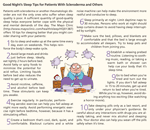Article
National Health Observances, Sleep Disturbances, and More
National Scleroderma Awareness Month, a time dedicated to drawing attention to the disease symptoms, prevalence, and related conditions.
Awakening Interest in Scleroderma and Sleep Disturbances
June was National Scleroderma Awareness Month, a time dedicated to drawing attention to the disease symptoms, prevalence, and related conditions, as well as the importance of early diagnosis. Like many other rheumatologic disorders, scleroderma is associated with sleep disturbances, according to a study published in Rheumatology.
FIGURE

Good Night;s Sleep for Patient's With Scleroderma and Others
The study investigators used several questionnaires to evaluate and monitor 180 patients who had scleroderma. All patients completed the Medical Outcomes Study Sleep measure (MOS-Sleep scale) at baseline; throughout the study, they also completed the 36-Item Short Form Health Survey, Health Assessment Questionnaire Disability Index, Functional Assessment of Chronic Illness Therapy–Fatigue, Center for Epidemiologic Studies Depression scale, and a University of California at Los Angeles Scleroderma Clinical Trial Consortium Gastrointestinal Tract Questionnaire. Descriptive statistics were assessed for 6 scales of MOS-Sleep and the 9-item sleep problem index (SLP-9; a composite index). The investigators computed Spearman’s rank-order correlations between these indices and developed a regression model to assess predictors of SLP-9 scores.
The study results showed that sleep disturbance is common in persons with scleroderma and causes symptoms that detract from quality of life. Although the patients slept an average of 7.1 hours a night, they scored worse on 4 of the 6 scales than the general population. In addition, depression, reflux, and worsening breathlessness and pain all were significantly associated with the SLP-9 (Frech T, Hays RD, Maranian P, et al. Prevalence and correlates of sleep disturbance in systemic sclerosis-results from the UCLA scleroderma quality of life study. Rheumatology. First published online February 15, 2011. http://www.rheumatology.oxfordjournals.org).
Morning Workouts Improve Sleep Quality
One more sleep tip for your patients: If you work out, do so in the morning! This advice comes from researchers in physical activity and sleep architecture from Appalachian State University who presented at the recent annual meeting of the American College of Sports Medicine (ACSM) and 2nd World Congress on Exercise is Medicine in Denver.
Insufficient sleep presents a threat to good health by contributing to chronic diseases, such as diabetes mellitus, cardiovascular disease, and obesity, according to the researchers, who studied the effects of exercise timing on sleep patterns. Aerobic exercise performed at 7 AM resulted in significantly greater improvements in quality of sleep than exercise performed at 1 PM and 7 PM. When patients exercised in the morning, they spent more time in light sleep by 85% and more time in deep sleep by 75%. Exercising at 7 AM also caused a 20% increase in sleep cycle frequency.
The researchers noted that well-timed exercise can elicit even greater sleep quality, and if their results hold true for the general population, exercisers can gain even greater benefits from physical activity. The National Sleep Foundation suggests that adults sleep at least 7 to 9 hours per day, but nearly 25% of persons in the United States do not get enough sleep.
For more information, visit the ACSM Web site at http://www.acsm.org. Or, contact the organization at American College of Sports Medicine, PO Box 1440, Indianapolis, IN 46206-1440; telephone: (317) 637-9200; fax: (317) 634-7817.
Men Exercise Their Right to Happiness
June also was Men’s Health Month. What makes them healthy and happy? A recent MSN Health poll revealed a few things that help improve the male sense of well-being that you may want to share with your patients:
•Regular exercise, even if it’s a simple daily walk outdoors. Survey respondents all reported that physical activity-especially when performed in the morning-helped the men feel more mentally organized and energetic throughout the day.
•Alone time, usually in the morning before the workday begins.
•Getting organized. Survey respondents reported that making a “to-do” list created a sense of accomplishment when they could cross things off the list. When reviewed retrospectively, the lists also provide a progress record.
•Time out with friends, and the opposite . . .
•Date night with a spouse or partner, away from home.
•Family time, especially quiet time with a spouse and individual time with children. The men reported that time spent with children allowed them to see the world with fresh eyes and a simpler perspective.
•An occasional big meal, a big bag meal that involves cheese or bacon or both.
•Philanthropy, and not necessarily just in the form of writing checks. One man polled said he strives to get 6 thank you’s a day as an indicator that he's on the “angel track.”




